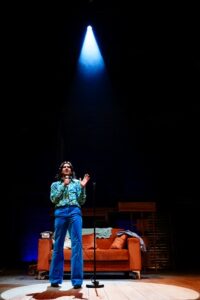A new take on a modern classic, as seen by Jessica Harris.
Spiritual journeys, psychedelia and swingers parties. Racial violence, punk and hard drugs. Strikes, unemployment and Enoch Powell. Britain in the 1970s is teetering on the edge. The record of the times has often been played. With just a bit of an update, we might feel it could be the record of the 2020s, except that in this passionate and playful adaptation of the novel of the same name by Hanif Kureishi, the experiences of an Indian family are at its heart, as first and second generation Indians making their home in the UK.
With humour and music at the fore, the production covers a lot of ground. The impact of moving to another culture and how people bridge this gap is central. As the characters work this through, conflict and comedy interplay. For the younger generation, conflict is often the result. Karim, played by Dee Ahluwalia, and Jamila, played by Nattasha Jayetileke, both reject and accept parts of their heritage, and both determine who they are in a cultural environment different from the one their elders grew up in.
 Comedy triumphs when elderly Aunty Jeeta always with shopping trolley, played by Rina Fatiania, endlessly dishes out samosas and garlic naan. But doubling as a member of a theatre company, Fatiania defies the mould and accuses Karim of stereotyping Indians when he bases his theatrical character on Uncle Anwar. Stereotypes are made and broken in quick succession.
Comedy triumphs when elderly Aunty Jeeta always with shopping trolley, played by Rina Fatiania, endlessly dishes out samosas and garlic naan. But doubling as a member of a theatre company, Fatiania defies the mould and accuses Karim of stereotyping Indians when he bases his theatrical character on Uncle Anwar. Stereotypes are made and broken in quick succession.
Accounts of racism are frequent, from the all-too-common assumptions made of people of Indian heritage, to racially motivated brutality. Karim, seeking a career in acting, is cast as Mowgli in The Jungle Book, loin cloth and all. Changez, a new arrival from India, undergoes the most vicious of attacks, reminding us that hatred and intolerance on the grounds of race are never far from the surface.
The opening up of sexual freedom and increased acceptance of diverse sexualities is another theme. Once again, comedy is played to the full, as bendy bananas and party poppers are used as metaphors. But there is also tenderness. Although the sex is casual, Karim and Jamila care deeply for each other and, whilst Jamila cannot feel sexual passion for her arranged marriage partner Changez, she welcomes him into her life as a loved and valued friend.
Throughout, The Buddha of Suburbia defies you to assume it’s going in one direction only and the ending does not tie the ends up neatly. Its characters know what their next steps might be but the road ahead is not yet fully known. As Karim says, his next move may not change the world, but it may be one small change for the better.
The first act, narrative in style rather than dramatic, feels slightly heavy-handed handed but the second act picks up the pace as characters are faced with choices. The actors are wonderfully versatile, with most doubling in several roles. Dee Ahluwalia as Karim holds the stage throughout, while Ankur Bahl as Haroon and Tommy Belshaw as Charlie are adaptive and watchable. Ewan Wardrop as the ill-motivated theatre director Matthew Pyke provides some great send-ups of the theatrical world.
The set, made up of ladders and platforms, has an appropriate degree of disorder about it, in keeping with the chaos of the times. The soundtrack of 1970s music, together with disco balls, dancing and lighting, is fantastically entertaining.
The Buddha of Suburbia is a co-production with Wise Children and adapted for the stage by Emma Rich, with Hanif Kureishi. It’s funny and it’s relevant. Get along there if you can.
The Buddha of Suburbia is at the RSC until 1st June. For further information visit rsc.org.uk.
Pics – Steve Tanner (c) RSC.


